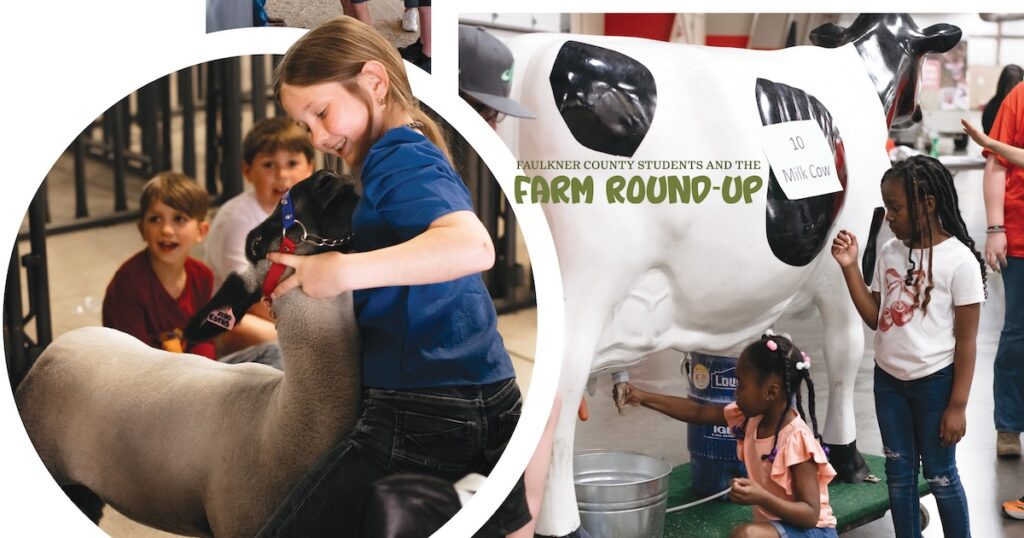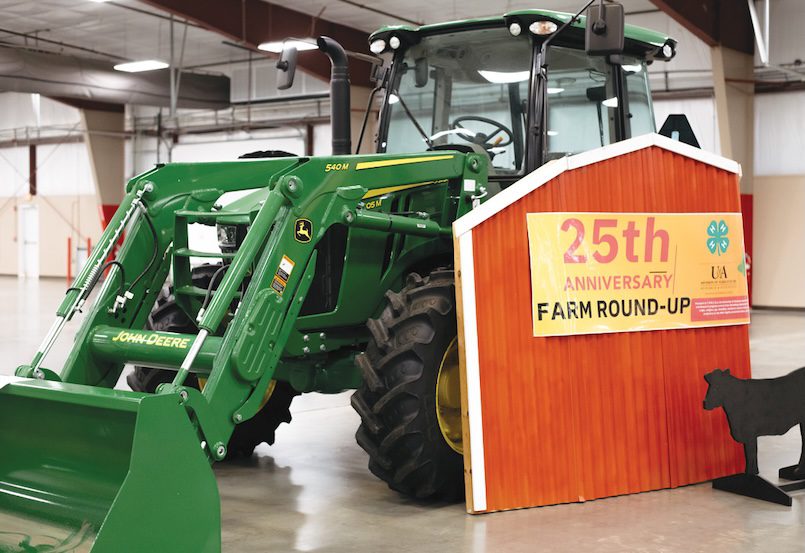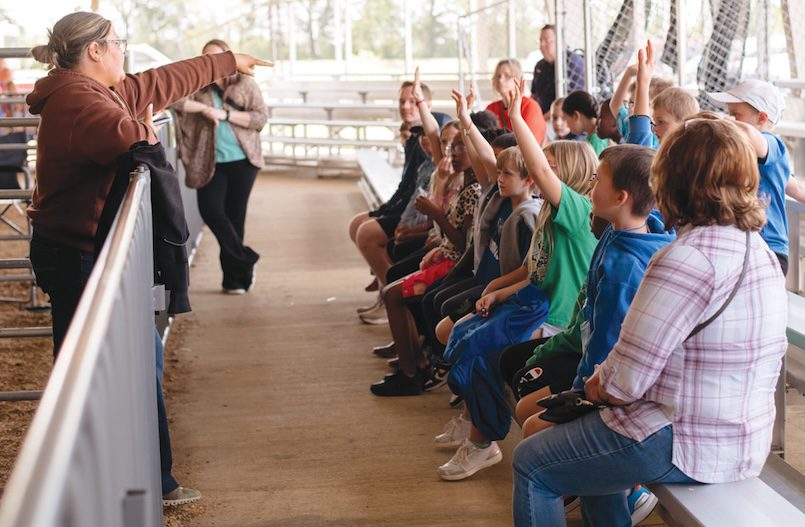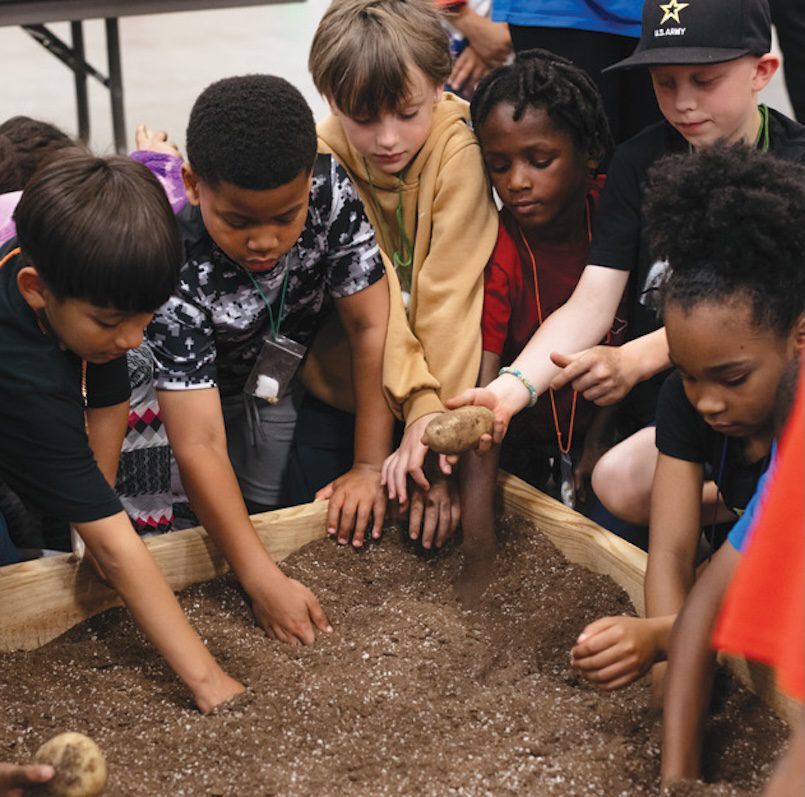01 Jun 2025 Faulkner County students and the farm round-up
By Judy Riley
Never underestimate what a few farm-interested people can do.
For 25 years, they have been telling the agriculture story to every second-grader in Faulkner County. It was a committee, just a handful of farmers who, with the assistance of their County Extension Service (CES) staff, wanted to share their farming story.

They had heard about a similar project under the leadership of Johnny Gonzales of Washington County CES. At that time, Staff Chair Bill Dodgen, fellow CES agents Jennifer Hawkins and Melanie Malone and a group of farmers visited Farm Friends in Fayetteville. They were determined to replicate it for Faulkner County. Today, as the county has grown, so has this activity. Over 800 Faulkner County second-graders recently convened in the Conway Expo Center for a fun, learning-filled day called Farm Round-Up.
“The goal 25 years ago remains the same today: exposing second-graders to the agriculture production going on right around them,” said Kami Green, CES agent in charge of the event. “We want kids to know the diversity of our agriculture, what is grown here and its importance.”
One of those original planners was Leanna Clark and she is still involved. She and her husband, Dr. Robert Clark, a former surgeon now deceased, founded Flying C Ranch southeast of Conway. They not only grow cattle, but operate a farm-to-table store on Rocky Point Road, where they sell their beef, pork and eggs. “We’ve always been good stewards of the land and proud of the products we produce. We want people to know that high-quality, safe and nutritious food is grown right here in Faulkner County. We carry an average of eight steers to a USDA-inspected processing plant each month,” said Clark, who is also a retired RN.

The students from all county schools are bused to the Conway Expo Center and then divided into small groups as they rotate through the learning stations. Each of the 16 stations includes a hands-on learning activity led by an adult knowledgeable about that crop or food.
A timekeeper makes certain that groups move through the areas so everyone partakes in the whole. Students get to milk a cow (plastic cow simulator), feel soil in a composting bin, see an actual bee hive, and plant a seed.
“The stations are as varied as the agriculture in Faulkner County,” said current CES agriculture agent Kevin Lawson, himself a veteran helper with the event. “We are one of the most agriculturally diverse counties in the state. If residents live in the metropolitan area of Conway, they often do not realize what is happening here. We have soybeans, rice, corn, hay, cattle, dairy, goats, sheep, swine, fruit crops, pecans, commercial horticulture and a huge home gardening and landscaping interest. We want the students to see what farmers are doing right in their own area.”

The germination station was operated by Renee Thrash, Regina Chaney and Sheila Harrel, who are part of the county Farm Bureau Women’s Leadership Committee. “Students learn the meaning of the term germination, then plant their own seed on a damp cotton ball, which is inserted into a small plastic bag, tied around their neck as a lanyard. As the seed germinates, students see the roots and shoots emerge. This is important for us to tell the story we see play out every day,” said Thrash. She and her husband, Joe, have River Valley Farms near Houston.
After rotating through the maze of stations within the expo building, the students travel outside to the livestock pens. Members of 4-H and FFA proudly show off their animal projects, telling how they raise their animals, even how to get an animal ready for the county fair. “We love to see the ‘ah-ha’ moments when the students get up close and personal with a hog, or even pet a goat. We hear comments from teachers that it is not only very educational for the students, but for the parents who often tag along to help,” said Green.

The agent is quick to give credit to the remaining CES staff, the sponsors and the many volunteers, particularly the Farm Bureau Women’s Leadership Committee. As the students and teachers leave, they receive a book, “The Seed in Jackie’s Garden,” and its accompanying educator’s guide for follow-up learning activities. Showcasing agriculture was the goal 25 years ago, and farmers in the 501 area are still at it.










